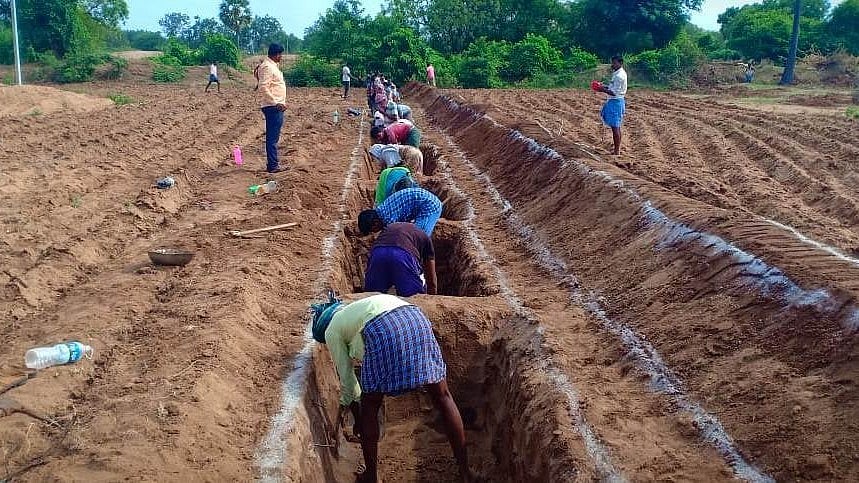
In Raichur, where temperatures in the day can reach anywhere between 42 to 45 degrees Celsius, MGNREGA workers continue to start their shifts only at 10 am, working through peak-time heat.
Credit: DH Photo
Bengaluru: Rising temperatures and heavy workloads have meant that MGNREGA workers across Kalyana and Kittur Karnataka, are experiencing thirst, dry mouth, dry eyes, headaches, and other dehydration and heat stress symptoms.
Out of 124 recently surveyed workers in 10 villages from Chikkodi taluk, Belagavi, 72.5 per cent of people work between 10 am and 5 pm and in 68.5 per cent of cases, no tented or shaded areas were provided where workers could take a break.
The survey, conducted by ActionAid, highlights the plight of workers, especially those working in regions highly prone to heat waves. Out of 31 districts in Karnataka, 15 are highly prone to extreme heat events.
In Raichur, where temperatures in the day can reach anywhere between 42 to 45 degrees Celsius, Mahatma Gandhi National Rural Employment Guarantee Act (MGNREGA) workers continue to start their shifts only at 10 am, working through peak-time heat.
“Since the gram panchayat officials mark attendance on the National Mobile Monitoring Service app, there is a lot of delay. They are able to cover ground and only record attendance at 10 am,” says Basavaraj Raichur of the Grameena Kooli Karmikara Sangha.
Additionally, considering extreme heat conditions, the government had announced a 30 per cent concession on workload, with full payment, for workers in the Belagavi and Kalaburagi revenue divisions. This includes Belagavi, Dharwad, Gadag, Haveri, Bagalkot, Vijayapura, Uttara Kannada, Bidar, Kalaburagi, Raichur, Yadgir, Koppal, Ballari and Vijayanagar. However, the survey notes that 75 per cent of surveyed workers were not aware of such a provision and were not provided with any concession.
“We have found that when such workload concessions are announced, only those who are aware and ask are provided with concessions,” says Mahantesh Hosamani, an activist from Bagalkot.
Working under the afternoon sun is particularly challenging for workers, given that very few essential facilities are available at the worksite. Shavanthagere Babu, a mate (frontline supervisor who oversees the work being done at MGNREGA work sites) in Raichur, explains that even water is often funded by mates. “I provide about three cans of water to the workers in my gram panchayat and have to buy it myself. I do not know if others do the same,” he explains.
The survey, conducted between April 10 and 12, was released on Monday. It highlights that 41 per cent of workers specified that no drinking water facilities existed. Out of 124 workers, 85 reported that there were no shaded or tented areas where they could take breaks.
“The concession was announced just a week ago, and we are working on it. As peak summer approaches, we will remedy any loopholes,” says Priyank Kharge, Minister of Rural Development and Panchayat Raj of Karnataka. As temperatures climb, Kharge says that the government will assess the situation and announce concessions on workloads where required.